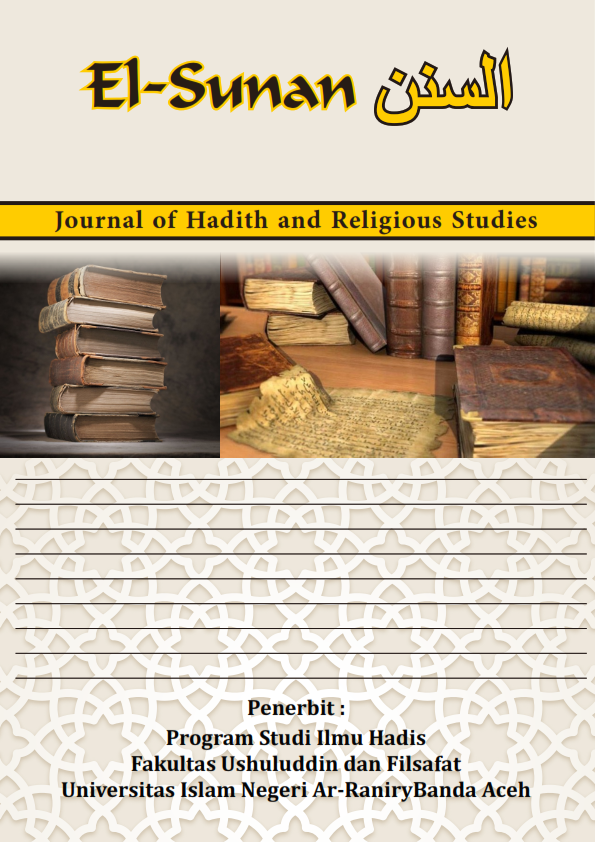The Contexts of Revelation: An In-Depth Study of Asbab Wurud Al-Hadith and Its Connection to Asbab Nuzul al-Quran
DOI:
https://doi.org/10.22373/el-sunan.v2i2.6474Keywords:
Al- Hadits, Asbab wurud, Asbab NuzulAbstract
This study aims to provide a comprehensive interpretation of the concept of Asbab Wurud al-Hadith, contemporary scholars' views, its classifications, and its connection to Asbab Nuzul al-Quran. Employing a library research method with a descriptive-analytical approach, the research involves gathering data, presenting scholarly perspectives, analyzing, and exploring the relationship between Asbab Wurud al-Hadith and Asbab Nuzul al-Quran. The study begins by defining Asbab Wurud al-Hadith and presenting the perspectives of contemporary scholars, followed by classifying the types of Asbab Wurud al-Hadith that underlie the delivery of specific hadiths by Prophet Muhammad (SAW). It also examines the interconnectedness of Asbab Wurud al-Hadith and Asbab Nuzul al-Quran, demonstrating how they complement one another in fostering a deeper understanding of Allah's (SWT) revelations and the sayings of Prophet Muhammad (SAW). The findings of this study can be summarized into three key points: First, Asbab Wurud al-Hadith is a branch of hadith studies focusing on the reasons behind the emergence of a hadith, whether driven by events, circumstances, or inquiries during its delivery by Prophet Muhammad (SAW). Contemporary scholars generally agree on its significance, albeit with varying opinions on the underlying factors of particular hadiths. Second, Asbab Wurud al-Hadith is divided into two categories: hadiths associated with specific causes (Asbab Wurud) and those without identifiable causes. Third, there is a strong correlation between Asbab Wurud al-Hadith and Asbab Nuzul al-Quran, as both serve similar roles in clarifying meanings, reconciling or prioritizing differing interpretations (tarjih), and providing explanations for the causes and implications of revelations. Furthermore, each can serve as a context for understanding the other.
References
Abdul Karim Bin Abdullah Al-Khudhair, Syarh Al-Lulu Al-Maknun Fi Ahwal Al-Asanid Wa Al-Mutun Li As-Syaikh Hafiz Bin Ahmad Bin Ali Al-Hakimi (Dar Kutub Al-Ilmiyyah, 2013).
Abu Abdullah Bin Ismail Bin Ibrahim Bin Al-Mughirah Al-Jafi Al-Bukhari, Al-Jami` Al-Musnad As-Shahih Al-Mukhtashar Min Umur Rasulillah SAW, Vol. 3 (Dar Thawq An-Naja, 2001).
Abu `Abdullah Muhammad Bin Yazid Al-Quzwaini, Sunan Ibnu Majah (Dar Al-Jail, 1998).
Abu Isa Muhammad Bin Isa At-Tirmidzi, Al-Jami Al-Kabir (Dar Al-`Arab Al-Islami, 1998).
Abu Husein Muslim Bin Hajjaj Bin Muslim Al-Qusyairi An-Nisaburi, Al-Jami As-Shahih Al-Musamma Shahih Muslim (Dar Al-Jail, tanpa tahun).
Abu Munzir Mahmud Bin Mustafa Bin Abdul Latif Al-Munawi, As-Syarh Al-Mukhtashar Li Nukhbah Al-Fikri Li Ibni Hajar Al-`Asqalani (Al-Maktabah Syamilah, 2011).
Ahmad Bin Hanbal, Musnad Imam Ahmad Bin Hanbal (Mu`assast Ar-Risalah, 1999).
Badr Abdul Hamid Hamisah, Ilmu Asbab Wurud Al-Hadits As-Syarif, Vol. 1 (Maktabah Ulum Al-Hadits, tanpa tahun).
Ibnu Hajar Al-Asqalani, *Fathu Al-Bari Syarh Shahih Al-Bukhari* (Maktabah Al-Asriyah, 2009).
Ibrahim Bin Muhammad Ibnu Hamzah Al-Husaini, Al-Bayan Wa Ta`rif Fi Asbab Wurud Al-Hadits As-Syarif, Vol. 1 (Al-Maktabah Al-Ilmiyah, 1982).
Muhammad Asri Bin Zainal Abidin, *Sabab Wurud Al-Hadits: Dhawabit Wa Maayir* (Dar Al-Kutub Al-`Ilmiyyah, 2006).
Muhammad Bin Muhammad Bin Sulaim Abu Syahbah, Al-Wasith Fi Ulum Wa Musthalah Al-Hadits (Dar Fikri Al-`Arabi, tanpa tahun).
Muhammad Rafat Sa`id, Asbab Wurud Al-Hadits (Wizarah Al-Awqaf Wa Syuun Al-Islamiyah, 1994).
Nuruddin Itir, *Manhaj Naqdi Fi Ulum Hadits* (Dar Al-Fikri, 1981).
Syed Abdul Majid Al-Ghauri, Al-Muyassar Fi `Ulum Al-Hadits (Dar Ibnu Katsir, 2009).
Syed Abdul Majid Al-Ghauri, Kamus Istilah Hadits (Dar As-Syakir, 2012).
Downloads
Published
How to Cite
Issue
Section
License
Copyright (c) 2024 Nur Baety Sofyan

This work is licensed under a Creative Commons Attribution-NonCommercial-ShareAlike 4.0 International License.
- Authors retain copyright and grant the journal right of first publication with the work simultaneously licensed under an Attribution-NonCommercial-ShareAlike 4.0 International (CC BY-NC-SA 4.0) that allows others to share the work with an acknowledgment of the work's authorship and initial publication in this journal.
- Authors are able to enter into separate, additional contractual arrangements for the non-exclusive distribution of the journal's published version of the work (e.g., post it to an institutional repository or publish it in a book), with an acknowledgment of its initial publication in this journal.
- Authors are permitted and encouraged to post their work online (e.g., in institutional repositories or on their website) prior to and during the submission process, as it can lead to productive exchanges, as well as earlier and greater citation of published work.










